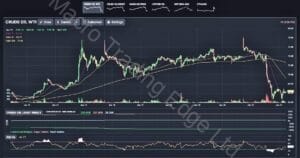Geopolitical Risk Premium and Oil Price Volatility
Oil Market and the Deflation of the Geopolitical Risk Premium
This Goldman Sachs prediction was a worst case scanario. The closure of the Strait of Hormuz would have a strategic mistake by Iran. For three reasons, it needs the money to prop up its regime and it would hurt its main market buyer – China. Third, the US navy would certainly then attack Iranian naval units and potentially its oil and gas production facilities. This would have been certaintly been the end of the Iranian regime. As our previous article notes, Iran has few options at this point. With the Trump ceasefire, oil is now below $70 per barrel and even falling below $65 barell.
The geopolitical risk premium in oil is now deflated, see chart below:

Potential Geopolitical Risk Premium on Oil
Goldman Sachs had predicted that Brent crude oil prices could surge to $100-$110 per barrel if Iran closes the Strait of Hormuz, disrupting oil flows significantly. This scenario assumes a 50% reduction in oil flow for one month and a continued 10% decrease over the following 11 months. After an initial spike, prices may settle around $95 by the year’s end. Current market sentiment already reflects increased geopolitical risk, with Brent trading above $78 per barrel.
Our view: this was a worst case scanario. The closure of the Strait of Hormuz would have a strategic mistake by Iran. For three reasons, it needs the money to prop up its regime and it would hurt its main market buyer – China. Third, the US navy would certainly then attack Iranian naval units and potentially its oil and gas production facilities. This would have certaintly been the end of the Iranian regime. As our previous article notes, Iran has few options at this point.
Key Points:
- Brent crude could peak at $110/barrel if Strait of Hormuz is closed by Iran.
- The scenario involves a substantial, prolonged disruption in oil flow.
- Goldman Sachs estimates a 52% chance of Iran closing the strait.
- Current Brent crude prices are over $78 per barrel amid rising geopolitical tensions.
- Oil prices will depend on supply disruptions or conflict de-escalation.
Goldman Sachs highlights that the Strait of Hormuz is a critical chokepoint through which approximately 20% of the world’s oil supply passes daily. Any significant disruption could severely impact global energy markets, leading to higher fuel prices and increased inflationary pressures worldwide.
The bank recommends investors and energy market participants closely monitor geopolitical developments in the region, particularly Iran’s actions and any responses from neighboring countries or international coalitions. Additionally, alternative oil supply routes and strategic reserves may help mitigate some of the potential supply shocks but are unlikely to fully offset the impact of a prolonged closure.
